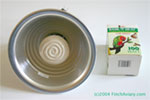|
Dealing with Illness
What should you do if you recognize illness in one of your birds? Well, the first thing is to isolate the bird. Don't take any chances with the lives of the other birds. Do not catch his/her mate/companion to keep the sick bird company. You might risk infecting the mate and the mate can also interfere with the bird's recovery. Place the bird in a hospital cage. A hospital cage can be purchased ready made, but these are unreasonably expensive. They can be built yourself if you are handy. Here is an article from Rob Salem's Java Finch Pages with detailed pictures about how to build a hospital cage. This article is so well written and well illustrated that I am going to have to get on my husband to make me one (someday when he has no other projects to occupy him - ha!). I do not have a specially designed hospital cage. Instead, I use a small cage purchased from a pet store. I cover half the cage in a towel to give the sick bird privacy and prevent drafts, and I place a ceramic heat lamp (purchased from Hornbeck's [now owned by Drs. Foster and Smith) over the uncovered half of the cage for additional heat (be sure to use a heat lamp designed for birds, small animals, or reptiles, to ensure they do not emit toxic fumes, such as from Teflon). A regular light bulb can be used instead, although the constant light may interfere with the bird's ability to get rest). Finally, I run a humidifier nearby to increase the humidity level. My hospital cage may not be perfect, but it provides privacy, additional warmth, and places to escape from the warmth when needed. It is only meant to help sustain the bird until I can get it to the vet or to provide a little extra heat while he is recuperating. Unless you really know what you are doing, SEEK HELP FROM AN AVIAN VETERINARIAN. I cannot emphasize this point enough. A veterinarian can perform several diagnostic tests that may identify the exact cause of the problem. A veterinarian can also prescribe a treatment geared toward the specific problem the bird is suffering from. If you try to treat yourself, you may do more harm than good. Using broad-spectrum antibiotics when not indicated also helps create antibiotic-resistant organisms, making currently available treatments less effective. Although I heartily support making use of avian veterinarians to treat illness, I must warn you that this approach does not guarantee success. Finches are very fragile when ill, and by the time symptoms appear, they may be too far gone. Sometimes their systems cannot withstand the treatment. Sometimes the veterinarian will be unable to diagnose conclusively. Even necropsies (which allow for much more thorough testing) frequently return inconclusive results. And sometimes, there is no treatment. I realize that seeing an avian vet is not an easy option for many people. It can be financially prohibitive, especially if you have a large flock of birds. And avian vets are hard to find. The following links may assist you in finding an avian vet in your area if you are in need:
I am fortunate enough to be able to travel to the Niles Animal Hospital and Bird Medical Center. Although it is inconveniently far away, it worth the long drive. (Check out their site for some bird-related articles). I know that many experienced finch-keepers are capable of diagnosing and treating some ailments themselves. I believe that this comes out of experience. They have either made enough visits to a veterinarian to be able to identify the illnesses and the corresponding treatment, or they have tackled it by trial and error (the error being the tragic part). I do not recommend this route to anyone new to finch-keeping, unless they have the guidance of an experienced finch-keeper they trust. If you do wish to try to treat your bird and a veterinarian is out of the question, some of the links listed here may provide helpful information. Since I will only take my birds to a vet, I don't have any experience with any recommended treatments and cannot make any assessments as to their effectiveness:
A word of caution about using an online forum to seek medical advice: it is difficult-to-impossible to diagnose a sick bird over the Internet. The same symptoms appear for many different types of illnesses and therefore a treatment that worked for one person's bird may be harmful to another with similar symptoms. I've never seen any forum participants claim to be a veterinarian (and if one did, you still have to be sceptical) and the advice you receive is therefore usually from a given person's limited experience and not from a sound medical perspective. Forums are always an option, though, especially if you need advice when your veterinarian is not available. And sound advice can be obtained there, particularly if the problem is a common one with a well-accepted avenue of treatment (such as egg-binding). Finchworld's Finch Forum is a good place to seek advice.
Click
Previous to return to the Signs of Illness page | Click Next
for the Quarantine page
|
HOME | CONSTRUCTION
| CARE | BIRDS
| ACCESSORIES | BACKGROUND
AVICAM | GALLERY
| GUESTBOOK | LINKS
| SEARCH
SITE MAP | DISCLAIMER
| CONTACT US
(c)2005 FinchAviary.com



